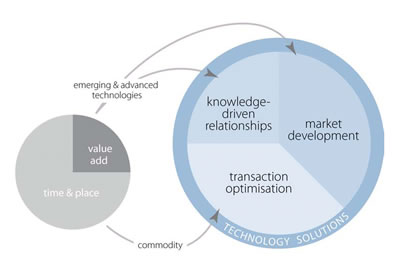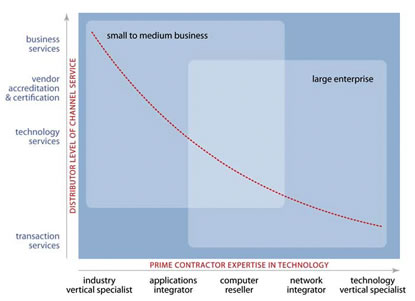Author:
Beyond the question of “which distributor should a vendor partner with?”, a more relevant question in many cases is – “do I even bother contracting a distributor?”
There is an old Buddhist philosophy that suggests in order to cut through the root of all phenomena and our attachment to its false representations, we need to first cut the root of the mind and its ignorance. This philosophy could not be more relevant to the selection of an ideal distributor. Answering the difficult question of “why bother contracting distribution?” with a contemporary business mind set will assist any vendor in cutting through the plethora of irrelevant (dare I say ignorant) Tender Response documents that focus on whether a distributor will be a good credit provider, or whether they can move boxes around efficiently.
So, do you even bother using a Channel?
First, ask yourself, as a vendor, what do I do? And therefore what do I not do? What does a channel do? What does a customer inevitably buy?
Business fundamentals dictate the need for contemporary channels in various IT sectors to translate complex technology into business benefits. A vendor’s responsibility is to create exceptional technology, create awareness and demand for this technology, and maximise sales.
But ongoing product development, combined with expanding customer awareness, drives the commoditisation of products – even with complex emerging technologies. The predicament from the end-customer perspective is that there is nothing commodity based, discretionary or un-considered about IT purchase decisions. This paradox – the commodity selling of complex technology – presents an enormous dilemma, and with it the real channel opportunity.
The channel therefore must assume the role of translating mass-marketed, complex technology into highly customised business enablement, productivity and continuity initiatives. End-users are not concerned with the technology and the general commoditisation of products, but they do expect that the channel will provide answers to the major concerns of modern business – corporate governance, business productivity, business systems enablement and business continuity.
OK, so a channel is critical to the vendor. Tick!
Now you need to divvy up responsibility and determine, “do I need resellers, distributors or both”? If so, “what kind of distributor”?
Why contract a channel of resellers?
Nobody owns a customer. Get over it! The best anyone can do is rent a customer and the entity best equipped to do so is the reseller. They hold prime contractor (and inevitably trusted advisor) responsibility for as much of their customers IT needs as they can cope with. Yes, resellers are critical. Tick!
In this context, to create the necessary channel culture to resolve the disparate needs of vendors and end-users, you will need to contract a proven “technology translation” model.
In doing so, you will need to contract a channel services provider (typically a distributor) to assist resellers to perform their role profitably. However, in today’s world, distributor must be able to deliver services that a reseller can augment into their own set of credentials and therefore say yes to every deal they come across (where your technology is suitable). In doing so, you have created the ultimate competitive advantage for your technology.
This criterion shifts the decision from “Time & place vs Value-add” to “ALL of the above”.

This allows prime contractors (resellers) to concentrate on their core competencies. In this way they fulfil their obligations to the end-user as competitively as possible.
The distributor must deliver a portfolio of technologies, not just yours (and in some cases competitive so get over it), and services in a business framework that enables vendors and resellers to deliver on the unique IT needs of their customers. The distributor will be free to establish a business partnership with any reseller who holds a transactional or prime contractor relationship with an enterprise to deliver cutting-edge IT initiatives.
Therefore, the distributor will:
- Help seek out additional revenue opportunities that are outside a resellers core competencies,
- Help prime vendors realise substantial cost savings, thereby increasing their own profitability, and
- Provide a strong competitive advantage for its vendors, thereby delivering to them a more permanent and substantial stake in the market.
Yes, distributors of this ilk are critical. Tick!
What is the profile of a contemporary distributor?
Against a plethora of commoditised products with little room to add value, the distributors business model must provide the vendor’s reseller partners a way to differentiate technology, translate it into business initiatives while maintaining the profitability of these technologically advanced IT solutions for their customers.
Clearly there is a need for specialised, technical, service-oriented distribution for contemporary IT products. The distributor must provide excellence in the specialised core functions of an outsourced operations centre for vendors, whilst simultaneously providing significant competitive value and competitive edge to both the vendor and the customer-facing reseller.
The distributors service portfolio needs to be flexible to cater for the varying needs of resellers who will differ based on their level of expertise in a vendors technology and the markets they address. The greater the reseller’s expertise in technology, the less they require from a distributor. That means a distributor must be able to offer a range of services from simple transactions to advanced business services.

Where the prime contractor is already a specialist in your technology, the distributor must be able to handle the ever-growing transactional requirements (eg. creative finance options, on-line ordering, accurate order processing, real-time reporting, license and serial number tracking, enforcement of multi-tier discounts, deal registration authorisation, and end-user contract pricing maintenance).
However, where the prime contractor is an expert in an industry, but less so in your technology, the distributor is required to provide a far broader offering. This may include dedicated technical resources, professional (technology) services, infrastructure design, advanced hardware replacement, staging and technology preparation, technical and sales consulting, education and IT infrastructure design, and specialist training.
Conclusion
A vendor needs a reseller to sell its technology. A vendor needs an effective distributor to make its technology saleable. In both cases, you (the vendor) need to firstly determine what you need from your channel, and identify partners who fulfil those needs.
Work on this premise and you will be successful in your selection. Seek independent advice that can tailor this premise for you, but for your sake, don’t engage in antiquated cookie cutter tender exercises. You will end up at the same place you started; asking the question … “do I even need a distributor”?
Nick Verykios is the Sales & Marketing Director of Distribution Central Pty Ltd. He can be contacted on nverykios@distributioncentral.com


